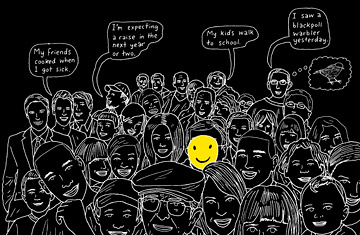
The whitewashed walls and gilded roofs of the Tashichho Dzong have withstood three centuries of fires, earthquakes and Himalayan winters. Inside this imposing fortress-monastery, in his elegant silk robe, Prime Minister Jigmi Thinley presides over the government of Bhutan, an idyllic Buddhist kingdom known for its gentle way of life. The fourth king coined the phrase gross national happiness (GNH) more than 30 years ago to suggest an enlightened Eastern alternative to the pressures of the materialistic West. Dare to call Bhutan "the happiest place on earth," however, and you are likely to provoke exasperated sighs from Thinley. He has made it his mission since taking office in 2008 to prove to the world that GNH is more than just a utopian dream. It has sometimes been a struggle. "Translating GNH in terms of your plans, policies and programs, that was lacking," he says. "That, particularly for me, was quite frustrating."
Bhutan has begun to use GNH as a broader and more nuanced measure of national progress than gross domestic product. Outside the monastery walls, Bhutan faces many of the same challenges as the rest of the world. The rural poor struggle to earn enough from farming, so they migrate to overburdened urban areas; middle-class families worry about young people graduating from college without job prospects. The elite, meanwhile, fret that their kids are spending too much time on Facebook or with their iPads.
Bhutan is, in other words, experiencing the Easterlin Paradox, named for American economist Richard Easterlin, who first established that beyond a certain threshold, rising incomes don't bring happiness. His most recent research finds the same paradox in China. In the U.S., meanwhile, economic insecurity is affecting reported levels of happiness. The General Social Survey, the oldest effort to measure well-being in the U.S., found in 2010 "the lowest levels we've ever had," Easterlin says. "The picture is not encouraging."
Bhutan's audacious solution is to build its society from the ground up using what it calls the "four pillars" of GNH: sustainable economic development, conservation of the environment, preservation of culture and good governance. It may be hard to draw conclusions from a tiny, aid-dependent country known as the Land of the Thunder Dragon, but in some ways, Bhutan is a perfect economic laboratory. Because it is a new democracy tiptoeing into the free market, its policymakers are free to try unorthodox ideas without being burdened by the legacy of how things were done before. Bhutan's happiness experiment has captured the fancy of economists and politicians from Brazil to Britain, Tokyo to Taiwan, who are looking for a new path to free-market prosperity--one that doesn't do so much damage to the environment, social equity and family life. "It's a very meaningful philosophy, not just for Bhutan but for other countries as well," says Claire Van der Vaeren, head of U.N. operations in Bhutan. "We think Bhutan is on to something very important."
Measuring Up
